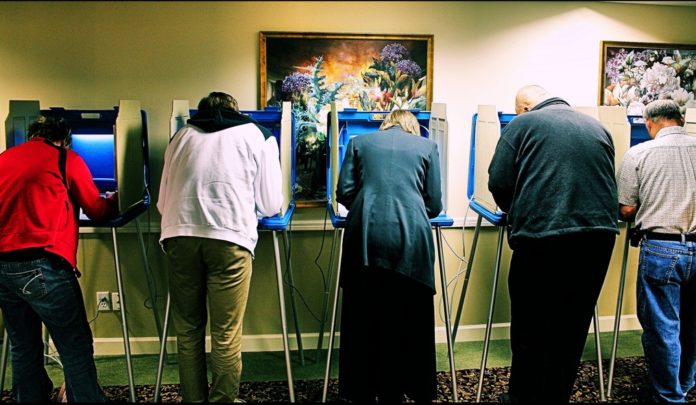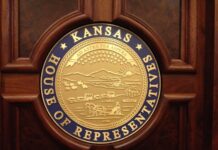Voting rights groups stepped up their efforts to stop a new election law passed by the Legislature, filing a motion late Thursday to block a provision that bans anyone from falsely representing themselves as an election official.
The motion is part of a broader state lawsuit challenging parts of two bills enacted this year – HB 2183 and HB 2332 – because they violate the state constitution by interfering with voting and violating Kansans’ freedom to free speech and association.
The motion was filed by the plaintiffs in the lawsuit: the League of Women Voters of Kansas, Loud Light, the Kansas Appleseed Center for Law and Justice and the Topeka Independent Living Resource Center.
They are seeking a partial temporary restraining order to immediately stop part of the law that addresses falsely representing election officials. It starts July 1.
Critics said this provision could lead to Kansans being charged with a crime just by helping someone register to vote.
The lawsuit said this provision would chill the free speech activities of various organizations to help Kansans know how to vote.
The lawsuit says the bill’s broad language “gives arbitrary discretion” in determining what constitutes conduct that may appear to be an election official.
The motion argued that the law will hinder efforts to register voters going into local elections this summer and fall.
The local primary elections are set for Aug. 3 and the voter registration deadline for that election is July 13.
“Plaintiffs are already engaging in robust voter registration, education and engagement efforts this summer and have plans to continue them in advance of this year’s August and November local elections,” the motion said.
“If the restriction goes into effect, plaintiffs will largely be unable to continue these activities due to the significant risk that someone might think their employees, members or volunteers are, or appear to be, election officials,” the motion states.
The plaintiffs argue that they will have to “significantly curtail” their voter registration and education efforts that they are planning for this summer because they can’t be certain that they will be perceived as an election official.
The lawsuit notes that violation of the law is a class 7 nonperson felony that could mean a jail sentence of 17 months and fines up to $100,000.
The plaintiffs contend the law directly limits free speech without sufficient justification, it’s too broad and “impermissibly vague.”
“This new law threatens any Kansan helping to register voters with a felony,” said Davis Hammet, president of Loud Light, the left leaning nonprofit voting rights group.
“It’s already a crime to impersonate an election official. This law makes it a crime if anyone even mistakes you for an election official regardless of your intention,” Hammet said in a statement.
“It’s too vague, too broad, and will have a devastating impact on democracy in Kansas if it’s not blocked.”
The state is now facing two lawsuits over the election laws passed by the Legislature last session.
A separate lawsuit filed in federal court says one of the laws passed last session places unconstitutional restrictions on the distribution of advance mail voting applications.
The lawsuits against Kansas had been talked up on social media by Marc Elias, a leading Democratic lawyer who is a national expert in election law.
Both lawsuits had been posted on Democracy Docket, the website he founded that’s described as a “progressive platform dedicated to opinion, advocacy, and information about voting rights, elections, redistricticting and democracy.”
















